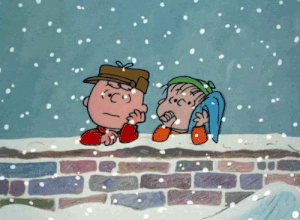‘If you ever believed in Santa—how did you find out that he wasn’t real?
And how did you feel about it?’
* * *
Some childish things I put away early—others I stayed attached to for too long. In my last year of primary school, Mrs Fanshawe asked if I had toys and things at my dad’s, gauging, I now suspect, whether to let him collect me at home time. I remember sensing I ought to nod, doing so even as I wondered who the hell still played with toys aged ten. (At the time, I would have said ‘who on earth’.) I knew by then that there was no Saint Nick, except the real one, who was a disappointment of a saint, but it hadn’t been long since I’d found out. I’m never sure whether I grew up too fast or too late.
The garden where Mum and I built snowmen had been a rubbish tip, and our house was designed equally messily. Five doors opened onto the living room, which must have been twelve square metres at most, and only three led into other rooms. Behind Mum’s storytelling chair, a cupboard with two compartments stretched from floor to ceiling. The top one smelt of truffles when you poked your head inside, and was where passports and grownup letters were stored—and, more importantly, chocolate boxes and booze. One night a year a glass of sherry was left out, next to a mince pie and half a carrot.
I think I was nineish when Mum fessed up. I distinctly recall lying in bed, hugging the wall the way I liked to when she prayed for me. Before lights out, we’d talk a while, then she would sing the end of Numbers 6—‘The Lord bless you and keep you, the Lord make his face shine upon you’. That night, she told me Nicholas had been a patron of children even during his life—so what did I think their parents told them after he died? It strikes me now this was likely a fairy tale too, that all I’d done was graduate from one fiction to another, but at the time my reaction was one of confusion. In the years since, that hasn’t changed.
People attached to telling children Santa Claus is real often complain I don’t get it. I don’t. It’s never been intuitive to me why telling someone things you know are false—not to safeguard their wellbeing or your own, but just to watch them smile on being duped—is cruel and degrading in principle but twee in one specific case. Learning that Father Christmas was a lie didn’t make me cry or act up, but lied to was exactly how I felt. This year my niece turned eight: being required to play along was hard, and I’ve known parents admit to being more conflicted than they let on.
When friends say stories of a man in a red suit—the other one—made Christmas magical, I think they mean that on some level, they knew makebelieve when they saw it, but that the power of ritual swept them up. I sympathise—all stories are enchantments, all words spells. The trouble is, Father Christmas was more than a story to me, more than something I half believed. I knew the tooth fairy was imaginary, that costumed men who gave us Dairy Milk on the last day of term were imposters—there was enough nudging and winking in each case—but as I saw it, the man himself was every bit as real as God.
Mum came to regret that particular literalism. ‘I made it into something it was never meant to be,’ she told me some years back. There are a lot of memes about Father Christmas and God, some better than others, but in my mind, they occupied exactly the same space. I was used to the idea whatever extraordinary things Mum spoke of must be true (and she spoke of far more extraordinary things than Christian children all receiving gifts on the same night)—to the idea holding extraordinary beliefs was itself virtuous, never more so than if hostile nonbelievers surrounded you.
It wasn’t simply that we were Christians: plenty of children raised in Christian homes are functionally able to distinguish makebelieve from sincere belief (supernatural or not) perfectly well. It was that Mum and her then-church practised an evangelicalism that never drew any such line. Magic, makebelieve, ritual, story, play—these were never acknowledged as mere suspensions of disbelief, or as a realm in which belief might constitute something subtly different. All beliefs were literal, and makebelieve itself was a dangerous and demon-haunted thing: thinking Halloween was only a game was how the enemy got you.
Atheists are often stereotyped as Philistines with one-dimensional worldviews and no grasp of aesthetics or ritual. That described my church upbringing more than it describes me. In my experience, letting stories be stories only strengthens their magic. Believing Santa Claus was real caused me to miss the beauty I now see in the leaving-out of a small sherry and a mince pie, and Mum’s prayers worked because of how she sang, not because she believed—because of a cupboard of secret things, a chair in which fantastic tales were told, and the first snowman in the world that never had to melt.
* * *
I tell stories and write a blog. If you enjoy my work,
consider becoming a patron or leaving a tip.
Follow my tweets at @AlexGabriel,
keep up with my writing, or get in touch.



